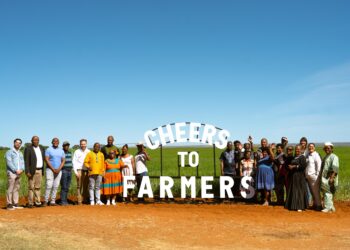In addressing the media at the conclusion of the first day of the G20 ministerial meeting, minister of agriculture John Steenhuisen said he was fairly happy with the proceedings, as the country has been able to bring everyone together under one vision.
He said he was disappointed that the meeting did not have a declaration because the United States and Argentina disagreed on diversity, gender equality and some climate change aspects.
Steenhuisen explained that he had signed a memorandum of intent with Japan to have agricultural cooperation between the two countries.
“We will be signing with Brazil also. The two countries are important agricultural partners as we seek to look into our diversification due to trade disruptions with the United States,” he said.
Threat of climate change
Steenhuisen called on the leaders to speak strongly about climate financing as the sector is facing huge challenges with the impact of adverse weather conditions.
He noted that climate change is the single greatest threat to global agriculture, and it was farmers, particularly small-scale producers, who felt its impact most directly. “Here in the Western Cape, the drought of 2017 forced farmers to reimagine water management, introducing drip irrigation, groundwater recharge, and diversified cropping.
“Across southern Africa, intercropping, conservation agriculture, and renewable-powered cold chains are helping communities to adapt and reduce risk. We have emphasised climate resilience as the backbone of agricultural sustainability.”
The minister said in South Africa, partnerships with universities and agritech companies are developing early-warning systems for pests and diseases, alongside blockchain traceability tools that make the country’s exports more competitive.
Related stories
- SA agri-exporters urged to seek new markets
- New awards spotlight SA agriculture’s rising stars
- Mashatile: SA heads back to US next week on tariffs
- Agri WC applauds farmers’ resilience, urges support
“Agriculture is not a sector that can be placed on the margins; it is the foundation of food security, livelihoods, and stability. Our presidency has been anchored on four key priorities: making markets more inclusive, empowering women and youth, fostering innovation and technology transfer, and building climate resilience.
“At the G20 level, we have strengthened cooperation on resilience through shared research and data platforms. The Agricultural Market Information System (AMIS) continues to provide vital transparency on global supply and demand, helping governments respond to price volatility before it escalates into crisis.”
Shaping the future of agriculture
He said the work that has been done for the past year is meant for farmers, which means greater access to resources, markets, and technologies. For consumers, they mean safer food, more stable prices, and better nutrition. For governments, they mean stronger rural economies, reduced vulnerabilities, and progress towards the Sustainable Development Goals.
“Looking forward, the outcomes of this meeting will inform the broader G20 agenda. Tomorrow, the food security task force will take forward complementary work on resilience and affordability, and in November, the leaders’ summit in Johannesburg will elevate our shared priorities into the communiqué. In this way, what we agree here will not end today, but will continue to shape global agriculture and food governance into the future.
“Our task is to send a clear and united message: that agriculture is central to prosperity, resilience, and sustainability, and that we as ministers are committed to ensuring that no community, no farmer, and no nation is left behind.”
Minister John Steenhuisen
The president and chief executive officer of the Agricultural Research Council (ARC), Dr Litha Magingxa, emphasised that the gathering was a great milestone for South Africa’s government, which was in discussion of a way forward in agriculture ahead of the much-anticipated G20 meeting.
Magingxa added that their organisation is happy with the progress that has been made by the department of agriculture and is looking forward to the outcomes, which he believes will transform the state of agriculture not only in South Africa but also for Africa.
READ NEXT: TVET colleges put agriculture at the heart of student development


















